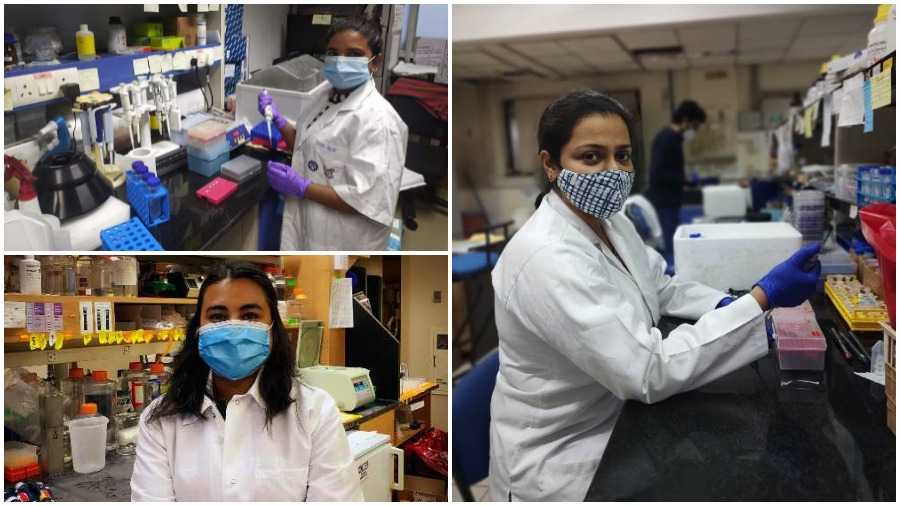Omicron, the new variant of Sars-CoV-2 has raised its head and brought in fresh ripples of anxiety. Two years into the pandemic, innumerable virologists all over the world have shifted their focus onto Covid-19 research. Many laboratories too have taken up Covid-19 research in right earnest.
After majoring in microbiology from Calcutta University, Feroza Begum had joined a virology lab in 2018. She was working on the dengue virus. When the pandemic struck, Feroza’s research was also affected as she could not go to the lab. “Using basic bioinformatics, I started work on Sars-CoV-2 proteins; mutation study and drug repurposition [repurposing or using old drugs to treat Covid-19]. It helped enrich my knowledge of the virus and I simultaneously learnt new techniques that are not commonly used in our lab,” says Feroza, who is a senior research fellow at the Indian Institute of Chemical Biology in Calcutta.
Feroza shifted her research from the dengue virus to Sars-CoV-2 and is currently working on vaccine development as well as pursuing basic research on the virus.
Harsha Raheja had started her PhD on the hepatitis C virus and its disease progression. Like Feroza, her research was also impaired due to the onset of the pandemic, and the lockdown and quarantine measures. The concept of work from home doesn’t really work for science researchers, especially those who perform benchwork experiments in the lab.
Harsha did her bachelor’s in microbiology from Delhi’s Gargi College and then joined the Indian Institute of Science, Bangalore, as an integrated PhD student in biological science.
Sars-CoV-2 is in the same group of RNA viruses as hepatitis C, says Harsha. She started working on the former in the third year of her PhD and is currently focusing her research on both the viruses.
The fact that there are so many researchers working on the virus at the same time might help in addressing the coronavirus concerns faster. However, it increases the competitive fervour manifold. Also, being a virologist in the era of Covid-19 comes with a lot of responsibility. “Everything must be done very fast. You think of working in one direction and the very next day something similar has already been published. As virologists, we have a slightly better understanding of the virus transmission, mutations, and know the importance of masks and vaccination. We are more appreciated now but it has also increased our sense of responsibility. We have to come up with ways to deal with the virus so that everyone can go back to their normal lifestyle as soon as possible,” says Harsha.
Most labs have had researchers working parallelly on this novel coronavirus as well as on their existing virus models. For Bidisha (Eshaani) Mitra, who is a postdoctoral research fellow at the Brigham and Women’s Hospital and Harvard Medical School, US, changing focus was not an option since she was in the midst of a transition. “The lab had other personnel who had the levy to explore Sars-CoV-2 research. While all the fascination and excitement were around this new pathogen, we couldn’t afford to lose momentum and time on federally funded ongoing projects,” says Bidisha. She is currently working on the oncogenic Epstein-Barr virus. She had previously worked on the hepatitis B virus during her doctoral research from the US’s Indiana University School of Medicine.
It is not mandatory to take up microbiology at the bachelor’s or master’s level in order to be a virologist and pursue researching viruses. A student from any discipline of biology can join a virology or infection biology lab and pursue research. However, majoring in microbiology can offer an added edge and help one grasp the research problem at hand, faster.
Science is a dynamic field; a microbiology graduate can pursue research in neurobiology, computational biology, developmental biology or ecology. Apart from research, it might be useful to know about other avenues one can venture into after graduating such as biotech or pharma industry, diagnostics, teaching and healthcare management. Talking to seniors, teachers and experts can help one take an informed decision about the career trajectory. Says Bidisha, “It is a privilege to study a new virulent pathogen and add value to a little-known research area.”











